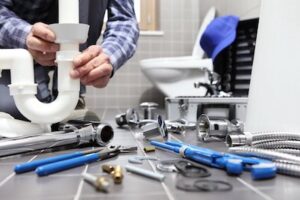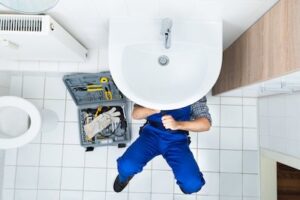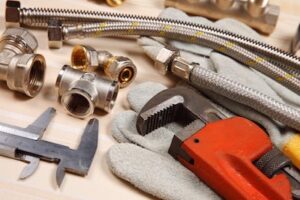Things You Should Know When Doing DIY Plumbing Maintenance
Most people don’t think about plumbing until there’s a problem and by then, it’s often too late! Plumbing problems can be expensive to fix, not to mention highly inconvenient. That’s why performing routine maintenance on your plumbing system is necessary.
11 Essential DIY Plumbing Maintenance Tips:
- Turn Off the Water Source
- Basic Understanding of Plumbing System
- Learn the Types of Pipes
- Use Proper Tools and Equipment
- Clean All of the Pipes and Fixtures
- Use Correct Size Pipes and Fittings
- Use Quality Materials and Parts
- Follow Manufacturer Instructions
- Inspect Your Plumbing Regularly
- Contact Local Authorities for Plumbing Permits
- Hire a Professional
This may all seem to be overwhelming or difficult, but don’t worry we’ll break down why you should do plumbing maintenance on your own, as well as all of these plumbing maintenance tips for you. In the future with these tips, you can keep your plumbing in tip-top shape and avoid costly repairs!

11 Essential DIY Plumbing Maintenance Tips
1. Turn Off the Water Source Before Starting
The first thing’s first, you need to always turn off the water source before starting your DIY plumbing maintenance. It’s easy to forget that water runs when you start your DIY project. Make sure it looks clean and smells like fresh air by turning off the faucet before beginning work on any repairs or installations to prevent mishaps such as leaks and flooding.
2. Have a Basic Understanding of the Plumbing System
We should all familiarize ourselves with the plumbing system in our homes and its layout. As this will help you know where each component is located and how it works. For example, knowing how to operate the removable wall panel is essential in case of any plumbing emergencies. You should also familiarize yourself with the main water shutoff valve’s location and ensure everyone knows how to use it. However, make sure to teach children not to play with removable wall panels as they can be dangerous. This is a key tip, as once you have familiarized yourself with the plumbing system, you will be able to know what type of maintenance each component needs. This way, you can focus on the areas that need attention and avoid wasting time on components that don’t require much upkeep.
3. Be Familiar with the Different Types of Pipes and Fittings
This tip stems from having a good understanding of your plumbing system, as once you know the system, you need to familiarize yourself with the different types of pipes and fittings that will be used in plumbing. At first, this can be daunting to identify all the different kinds. So, in order to make this process less complicated, you should become familiar with the various pieces on your home’s system so that when one needs replacing or repairing, it will not take long for someone who knows what they’re doing to get them fixed!
4. Always Use the Proper Tools and Equipment
When working with your hands, always wear protective gloves to avoid puncturing or tearing the skin on any part of you that could get caught in a plumbing fixture. If tools are involved in this project, such as pliers and wire cutters, then ensure they’re extra safe by wearing safety glasses while handling them so no one gets hurt!
5. Be Sure to Clean All the Fixtures and Pipes Thoroughly Before Starting Any Repair or Replacement Work
It would help if you took special care when working in any area with water-based fixtures and lines, as these are highly susceptible to mold growth. Ensure all exposed surfaces have been cleaned thoroughly before proceeding with repairs or replacements so as not to leave behind a toxic mess!
6. When Replacing a Fixture or Pipe, Use the Same Type and Size
If you’re doing some plumbing maintenance at home, it’s important to use the same type and size of pipe or fitting when replacing a pipe or fixture so that it fits and performs properly. This will help to ensure that your plumbing system continues to function properly. Different types of pipes and fittings can have different diameters, which can lead to problems if they’re not compatible. Using the same type and size of pipe or fitting will help to avoid these problems and help make sure that you don’t get confused.
7. Use High-Quality Plumbing Materials and Products
Good plumbing is a necessary part of your home and so you should be using high-quality plumbing materials and products when doing plumbing maintenance. Failing to do so can lead to more significant issues in the future. In addition to the previous tip of using the same type and size of pipe or fitting, it’s also important to use the same material. As different materials can have different properties, which can affect how well they work with your plumbing system. For example, some materials are more resistant to corrosion than others and so using the same material will help to ensure that your plumbing system continues to function properly.
8. Always Follow the Manufacturer’s Instructions
You should always follow the manufacturer’s instructions for maintenance or repairs. This may sound simple, but some things can get lost in translation when reading them at first glance – don’t let this happen!
9. Inspect Your Plumbing Regularly
This is a key tip to keep your plumbing system well-maintained and prevent plumbing issues in the future. You should be regularly inspecting your plumbing system by checking for any signs of leaks or damage and making sure all connections are tight. Your plumbing system is one of the most critical parts of your premise and so you need to keep it running smoothly. Which you can make sure of by doing routine maintenance on it every few months.
10. Contact Local Authorities for Permits Before Starting
Some localities require permits for work on your plumbing system, so make sure you contact the right agency and get those before starting any renovations or repairs! Be sure to contact your local city or county office for any permits needed before starting any work on your plumbing system.
11. Hire a Professional Plumber if You Are Not Confident Doing the Work Yourself
If you have a significant plumbing problem, such as a burst pipe, it’s best to hire a professional plumber. Attempting to fix the problem yourself could worsen and potentially cause severe damage to your premise.
Why Should You Do Your Plumbing Maintenance?
Your commercial space is an important investment, so it makes sense to do everything possible to protect it. Part of that protection is ensuring your plumbing is in good working order. While you may not be a professional plumber, there are some maintenance tasks you can do yourself to keep your plumbing system running smoothly. Here are some reasons why you should do your plumbing maintenance:
1. Saving Money
Professional plumbers can be expensive, so doing simple tasks can save a lot of money.
2. Preventing Problems
Regularly maintaining your plumbing can help prevent more significant issues. It will save you both time and money in the long run.
3. Knowing Your System
You’ll get to know your plumbing system better by doing your maintenance. It can come in handy if you ever have a problem that needs fixing.
4. Feeling Empowered
A sense of satisfaction comes with being able to do your home repairs and maintenance tasks. Doing your plumbing maintenance can give you a feeling of empowerment and independence.
It can save money, help prevent problems, get to know your system better and make you feel empowered. So, roll up your sleeves and keep your plumbing in top condition!

DIY Plumbing Maintenance: Is It Worth the Savings?
A debate raging on the internet: is it worth it to do your plumbing maintenance, or should you call a professional? On one side of the argument are those who say that DIY-ing your plumbing maintenance can save you money in the long run. On the other hand, others argue that attempting to solve plumbing issues on your own can wind up costing you more money and inflicting even more harm. So, which is it? Is DIY-ing worth it, or should you leave it to the professionals?
The answer is that it depends. If you’re a handy person who enjoys taking on projects, then DIYing your plumbing maintenance might be a good option for you. However, if you’re not particularly handy or experienced with home improvement projects, it might be best to call a professional.
Fixing a leaky faucet or unclogging a drain are easy plumbing issues. However, other plumbing problems are much more challenging to fix, such as leaks in the pipes or a broken water heater. If you’re unsure whether you can specify a particular problem, it’s always best to err on the side of caution and call a professional.
Another thing to consider is the cost of materials. If you need to buy new pipes or a new water heater, the cost of those materials can add up quickly. Sometimes, paying a professional for the job might be cheaper than buying the materials.
Final Thoughts
These are some crucial points to remember while performing DIY plumbing maintenance and by doing your plumbing maintenance, it is a great way to save some cash. Of course, any DIY project is risky, so weighing the pros and cons before you start is essential. However, remember that if you feel uncomfortable or uncertain about what you’re doing at any time, don’t hesitate to call a professional for help. We hope this article has helped give you a better understanding of what’s involved in maintaining your plumbing system on your own!

